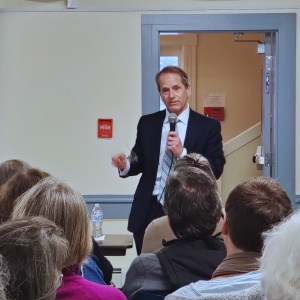Survey shows depth of housing anxieties

BIA President and CEO Michael Skelton —COURTESY PHOTO
| Published: 12-07-2023 10:28 AM |
Nearly three quarters of New Hampshire residents consider the affordable housing situation here as “serious.”
They cite a range of reasons, including greed and wealthy out-of-state buyers.
The findings are included in a Report on Consumer Confidence, part of a wide-ranging survey done earlier this month by the University of New Hampshire Survey Center on behalf of the Business and Industry Association (BIA).
“The chronic lack of housing options affordable to our workforce as a whole leads to the frustration seen in the most recent BIA Report on Consumer Confidence,” BIA President and CEO Michael Skelton said in a statement to NHBR. “BIA aggressively advocates for state policies and financial incentives to spur the development of more affordable workforce housing, because housing is at the center of our worker shortage.”
The Report on Consumer Confidence covered a variety of topics in addition to housing, including measures of how people are feeling about their personal finances, their household finances, their feelings about energy costs and interest rates, and their view of the overall business climate both here in the Granite State and in the United States.
The survey shows a decidedly lack of confidence in the affordability of housing in the Granite State. Housing ownership over the years has been made difficult by a lack of supply, rising prices and continuing challenges with affordability exacerbated by rising interest rates and property taxes.
According to the survey, nearly three-quarters (73%) of New Hampshire residents believe the affordable housing problem in New Hampshire is “very serious” and an additional 19% believe the problem is “somewhat serious.” Only 7% of respondents consider the problem as “not very serious at all.”
A notable data point is that, since the last Consumer Confidence Report in February of this year, the percentage of people who believe the housing problem is “very serious” has grown by 12 points.
Article continues after...
Yesterday's Most Read Articles
 Peterborough voters approve a $11.7 million bond to fund a new Fire and Rescue Station
Peterborough voters approve a $11.7 million bond to fund a new Fire and Rescue Station
 ConVal’s Kimberly Rizzo Saunders named Superintendent of the Year
ConVal’s Kimberly Rizzo Saunders named Superintendent of the Year
 Reality Check receives approval to move into Redeeming Grace Church
Reality Check receives approval to move into Redeeming Grace Church
 Frank Edelblut speaks at Dublin Education Advisory Committee forum
Frank Edelblut speaks at Dublin Education Advisory Committee forum
 New look at Gregg Lake
New look at Gregg Lake
Only 6% of respondents believe now is a good time to buy a home, while 77% think it’s a bad time.
Asked their opinion as to why the problem is as bad as it is, lack of supply came out on top (22%), followed by greed (11%), out-of-state buyers (9%), inflation/the economy (6%), interest rates (5%), and zoning (5%).
According to Skelton, gains were made during the last session to address the lack of housing with appropriations to New Hampshire’s Affordable Housing Fund and InvestNH program, which seeks to boost affordable housing construction. The state budget also funds the Housing Champions program to reward municipalities that voluntarily make significant efforts to increase high-density housing in their communities.
“However, these and continued legislative actions will take time to bring balance back to our home and rental markets,” Skelton said.
In the upcoming legislative session in 2024, the BIA said it is keeping close watch on several housing proposals. One would create a tax credit to incentivize converting underused or abandoned historic structures like old mills into housing. Another seeks to restore the state’s original definition of an abutter to align it with the concept of legal standing in local land-use decision-making. In short, abutters must show particularized harm to have standing to appeal decisions.
“New Hampshire’s strong economy provides great opportunities for workers,” Skelton said. “But the scarcity of housing continues to keep rent and home-ownership difficult for many, especially those with moderate to low incomes. Workers are the lifeblood of New Hampshire’s economy. We need more of them and more housing for them.”
There’s some optimism among Granite Staters in how they feel businesses in the state will do over the next 12 months.
The survey showed 28% believe businesses will enjoy good times over the next year, while 22% believe they’ll experience bad times, and 50% anticipate mixed results. That 28% with the highest degree of optimism is at its highest point since August 2021.
The survey showed that optimism or pessimism about the business climate can be influenced by politics. The report said 54% of Democrats anticipate good business conditions locally, but only 20% of Independent voters and 11% of Republicans feel that way.
Granite Staters are more optimistic about their state economy than they are about the national economy.
Only 19% think businesses across the country will have a good year in 2024, 38% anticipate a bad year, and 42% think it’ll be a mixed bag. Again, politics play a part in the thinking: 62% of Republicans and 51% of Independents see bad times ahead nationally, while only 11% of Democrats are pessimistic.
On issues close to home, nearly half (46%) of Granite Staters believe they are worse off than a year ago. Only 15% say they are better off.
The survey showed 70% of Granite Staters are worried about their energy costs this winter, only 20% expect their personal financial situation to improve in the months ahead, while 32% expect they’ll be worse off.
Asked about how interest rates impact their buying behavior, 37% say higher rates have prevented them or made them less likely to buy a car, 28% say they’re using their credit cards less to make purchases, and 28% said it has made them less likely to purchase a home.
The BIA and others have long tied the lack of affordable housing and the workforce shortage together. Higher living costs only compound the problem.
Skelton said as part of the report that “the scarcity of housing continues to keep rent and home-ownership difficult for many, especially those with moderate to low incomes. The high cost of housing also makes it more difficult to pay energy costs in New Hampshire that are among the nation’s highest. These remain top issues for our elected leaders to tackle to expand prosperity.”
These articles are being shared by partners in The Granite State News Collaborative. For more information visit collaborativenh.org.


